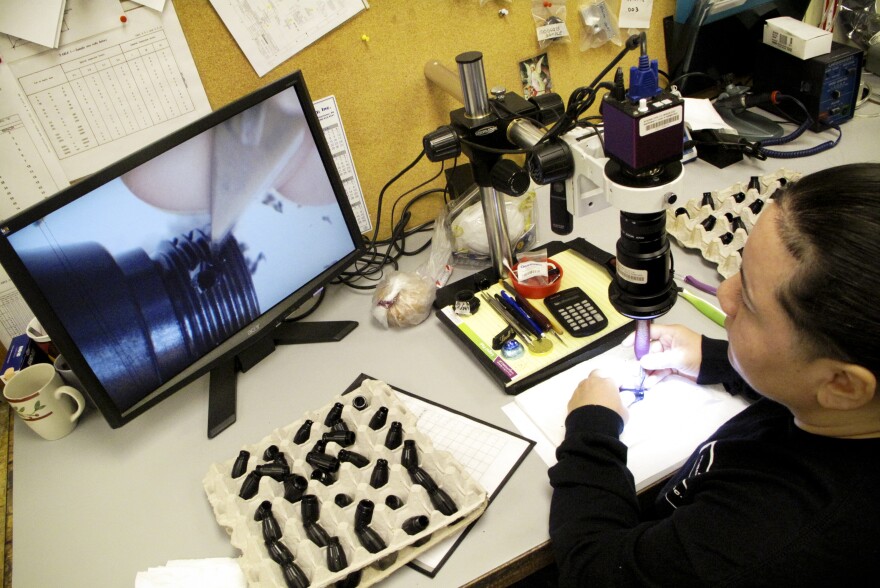

As the U.S. economy continues to recover, it has been getting some help from an unexpected place. After decades of massive job losses, manufacturing firms have been steadily creating jobs — many of them well-paying. One particularly bright spot is a new generation of high-tech manufacturers.
At a company called Machine Inc. in Stoughton, Mass., a hulking computer-controlled milling machine is making an intricate aerospace component. "It goes in as an aluminum block, and finishes up as a completed manifold," says Richard Mileika, the company's founder. What used to be that aluminum block is now a precisely shaped component with eight different holes in it to channel oxygen inside an airplane.
One thing stands out right away at the factory: There are more machines and robotic arms working away on the factory floor than there are actual people running this equipment. And that's a big part of why this company can exist.
To compete with cheaper labor abroad, U.S. manufacturing has gotten more productive. That means it's been making more stuff with fewer workers. Actually, at lunch and overnight there are no people at all on the floor — just machines doing the work.
"That is our weapon for being competitive — whether it's local competitors or global — being flexible and being productive," Mileika says.
But even as lean and mean as this operation is, Mileika has been buying more machines and hiring more workers.
He's expanded his workforce by 30 percent from where it was just before the recession hit. And, he says, "we see growth over the next year." Mileika says he'd like to hire more people — especially if he could find workers with the skills to run this equipment. Skilled workers like that are in short supply. And manufacturers like this one are working with local community colleges or vocational schools to try to train more workers more quickly.
A Turnaround In Manufacturing?
Since 2010, U.S. manufacturers have added 665,000 jobs. Now some economists say that doesn't mean much. Manufacturing lost nearly 7 million jobs in the 30 years before that, so historically this could be just a blip. They expect job losses will soon continue in the long, sad story about the decline of manufacturing jobs in America.
But others aren't so sure that's the right way to look at it.
"I think that's an old story," says Barry Bluestone, an economist at Northeastern University in Boston. He's been studying the 7,000 manufacturing businesses in Massachusetts, surveying hundreds of them and making site visits to dozens.
"We're seeing a new, almost renaissance in manufacturing," he says. Bluestone says manufacturers are learning new technologies, and new manufacturing technologies are being developed at major universities. Nanotechnology, for example, holds great promise for cutting-edge U.S. manufacturing firms, he says.
From Pink Flamingos To Heart Pumps
Bluestone says he's seen many companies transform themselves into high-tech competitive operations, whereas before they used to make much lower-tech products — in one case it was lawn ornaments. "The pink flamingos that were made in Leominster, Mass., the plastics capital of New England. .. . Well, that same company is now making medical equipment," he says.
While many higher-tech firms are growing, other less-competitive firms are dying. And the government projects U.S. manufacturing jobs overall will decline a bit by 2020.
At the same time, though, a lot of manufacturing workers are older — and getting ready to retire. "There are millions of jobs that will open up in manufacturing as the current workforce retires," Bluestone says. Many of the manufacturers he's talked to "tell us their No. 1 issue is where will the skilled workers come from to replace those that are retiring today," he says.
Enrico Moretti, an economist at the University of California, Berkeley, is not as bullish as Bluestone. He thinks there are still a lot of less-competitive manufacturing firms that could be in trouble. But he says manufacturing jobs do tend to pay well — and so they have a bigger impact on the economy than many other types of work.
Moretti says that one job in manufacturing ultimately creates 1.6 additional jobs in local services outside the manufacturing sector.
Those higher paid, high-tech manufacturing jobs have an even bigger effect — several times bigger, Moretti says. So if those "advanced manufacturing" firms continue to grow and hire more workers, that could provide at least some boost to the U.S. economy.
Copyright 2023 NPR. To see more, visit https://www.npr.org.






